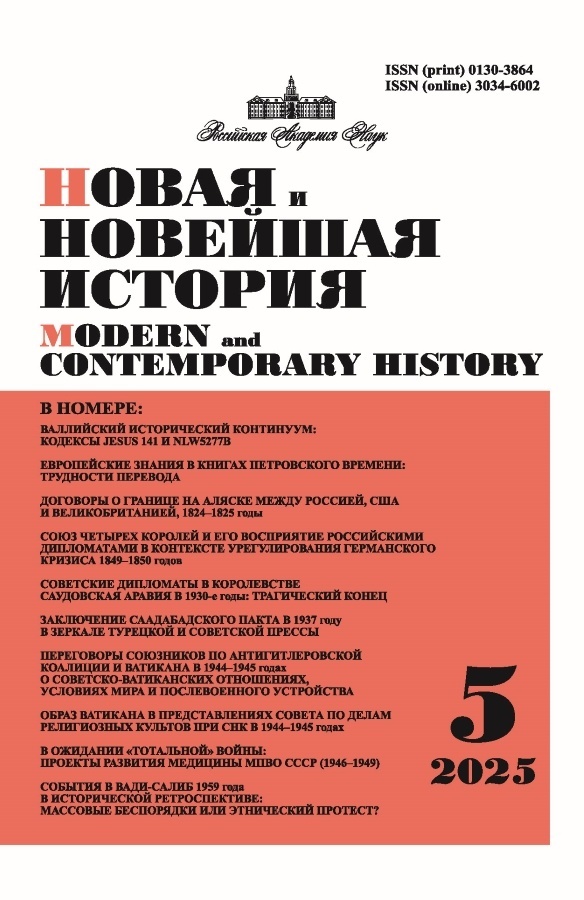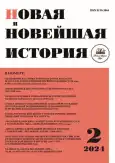“The Man from Moscow”: Kenneth Koma and the USSR’s relations with Botswana in the 1960s – the first half of the 1970s
- Authors: Voevodskiy A.V.1,2,3
-
Affiliations:
- HSE University
- Institute of World History, Russian Academy of Science
- The Russian Academy of National Economy and Public Administration
- Issue: No 2 (2024)
- Pages: 101-113
- Section: 20th century
- URL: https://rjsvd.com/0130-3864/article/view/671901
- DOI: https://doi.org/10.31857/S0130386424010083
- ID: 671901
Cite item
Abstract
The 1960s were a time of dramatic political changes on the African continent: within a decade, more than two dozen independent states appeared on it. However, in Southern Africa, colonial (Angola, Mozambique) and racist regimes (South Africa, Rhodesia) maintained their positions, which made this region one of the hottest places of the Cold War confrontation. The Soviet Union was closely involved in the struggle for the liberation of African peoples. The purpose of the article is to analyze the USSR’s policy towards Botswana and its contacts with Botswana political parties, primarily with the opposition National Front. The research is based on archival documents from the State Archive of the Russian Federation (GA RF) as well as published documents and memoirs. As a result of the study, it was concluded that despite ideological differences (Botswana adhered to a pro-Western orientation), the USSR, based on pragmatic considerations and the need to use the territory of Botswana by friendly liberation movements in Southern Africa, pursued a pragmatic course of rapprochement with Gaborone. Attempts by the Marxist National Front and its leader Kenneth Koma to establish direct contacts with Moscow ended in vain. The position of the South African liberation movements played a role in the USSR’s orientation, which emphasizes the need to take into account the role of different participants and factors in the development of Soviet policy in Africa during the Cold War.
Full Text
About the authors
A. V. Voevodskiy
HSE University; Institute of World History, Russian Academy of Science; The Russian Academy of National Economy and Public Administration
Author for correspondence.
Email: valeks77@mail.ru
Scopus Author ID: 57219550612
ResearcherId: K-7999-2015
доцент, старший научный сотрудник
Russian Federation, Moscow; Moscow; Moscow;References
- Filatova I.I. N.R. Mandela // Istorija Afriki v biografijah [History of Africa in biographies]. Moskva, 2012. S. 192–207. (In Russ.)
- Koma K. Uroki kongolezskogo krizisa, 1960–1963 gg. [Lessons from the Congo crisis, 1960–1963]: dis. … kand. ist. nauk. Moskva, 1964. (In Russ.)
- Rossiia i Afrika. Dokumenty i materialy. 1961 — nachalo 1970-kh [Russia and Africa. Documents and materials. 1961 — early 1970s] / otv. red. S.V. Mazov, A.B. Davidson. Moskva, 2021. (In Russ.)
- Sharyi V.I. Sotrudnichestvo SSSR so stranami Afriki v 1960–1980-e gg.: istoricheskoe issledovanie (na primere byvshih portugal’skikh kolonij) [Cooperation between the USSR and African countries in the 1960–1980s: a historical study (based on example of former Portuguese colonies):] dis. … kand. ist. nauk. Moskva, 2010. (In Russ.)
- Shubin V.G. Afrikanskii nacional’nyi kongress v gody podpol’ia i vooruzhennoj bor’by. [African National Congress during the years of underground and armed struggle] Moskva, 1999. (In Russ.)
- Tokarev A.A. Voenno-politicheskoe sotrudnichestvo SSSR/Rossii s byvshimi portugal’skimi kolonijami v Afrike (1960-e — nachalo 2000-kh gg.) [Military-political cooperation of the USSR/Russia with the former Portuguese colonies in Africa (1960s — early 2000s)] // Iug Afriki: nasledie proshlogo i nastoiaschee / otv. red. L.N. Rytov. Moskva, 2006. S. 223–226. (In Russ.)
- Eastern Europe, the Soviet Union, and Africa New Perspectives on the Era of Decolonization, 1950s to 1990s / eds L. Dallywater, Ch. Saunders, H.A. Fonseca. Oldenbourg, 2023.
- Filatova I., Davidson A. The Hidden Thread. Russia and South Africa in the Soviet Era. Johannesburg, 2013.
- Filatova I.I. The Lasting Legacy: The Soviet Theory of the National-Democratic Revolution and South Africa // South African Historical Journal. 2012. Vol. 64. № 3. P. 507–537.
- Keitseng “Fish” N.T. Comrade Fish: Memories of a Motswana in the ANC Underground / eds B. Morton, J. Ramsay. Revised Internet Edition, January 2018 // URL: https://www.academia.edu/35672165/Comrade_Fish_Memories_of_a_Motswana_in_the_ANC_Underground_Revised_internet_edition_2018 (access date: 10.08.2023).
- Kwante M.C. Kwante, Manatsha B.T. Origins and Dynamics of the Botswana-Soviet Union Relations, 1960s to 1990 // Botswana Notes and Records. 2016. Vol. 48. P. 85–96.
- Makgala Ch.J. The BNF and BDP’s “Fight” for the Attention of the ANC, 1912–2004: A Historical Perspective // Botswana Notes and Records. 2006. Vol. 38. P. 115–133.
- Morima N.A. Remembering the unwanted: Dr. Kenneth Koma // Weekendpost. 2016. 5th April. URL: https://www.weekendpost.co.bw/25337/columns/remembering-the-unwanted-dr-kenneth-koma/ (access date: 09.08.2023).
- Ramsay J., Morton B., Morton F. Historical Dictionary of Botswana. Lanham, 1996.
- Sellström T. Sweden and National Liberation in Southern Africa: Solidarity and assistance, 1970–1994. Vol. II. Solidarity and Assistance1970–1994. Uppsala, 2002.
- Shubin V. The Hot “Cold War”. The USSR in Southern Africa. London, 2008.
- Sobukwe J.M. R. The Opening Address delivered by Mangaliso R. Sobukwe at The Africanist Inaugural Convention // The Africanist. 1959. Vol. 5. № 1. P. 3–9.
- Southern African Liberation Movements and the Global Cold War “East”. Transnational Activism 1960–1990 / eds L. Dallywater, Ch. Saunders, H.A. Fonseca. Berlin, 2019.
- Telepneva N. Cold War liberation: the Soviet Union and the collapse of the Portuguese empire in Africa, 1961–1975. Chapel Hill, 2021.
- Voevodskiy A. The Sino-Soviet Split and Soviet Policy towards Southern African Liberation Movements in the early 1960s // Eastern Europe, the Soviet Union, and Africa New Perspectives on the Era of Decolonization, 1950s to 1990s. Berlin, 2023. P. 179–197.
- Westad O.A. The Global Cold War. Third World Interventions and the Making of Our Times. Cambridge, 2005.
Supplementary files











